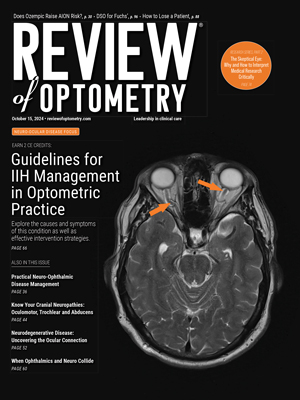Due to the concerns of the development of antibiotic drug resistance and the risk of side effects with corticosteroid use, researchers have been on the hunt for unique alternatives, including blood drops and lactobionic acid.1,2 Now, an Australian study shows honey might be as beneficial for dry eyes as it is for a dry throat. Leptospermum spp. (manuka) honey shows promise as an alternative or adjunct management strategy in the treatment of inflammation in dry eye disease (DED).3
The investigators evaluated the effects of an eye drop with manuka honey vs. a conventional ocular lubricant on tear film properties, ocular surface staining and comfort in 42 participants with dry eye-related symptoms after 28 days of treatment. They found the tear film evaporation rate had significantly greater reduction with the formulated eye drop, and tear break-up time (TBUT) showed a slight, but not statistically significant, increase with the manuka honey eye drop.
The researchers noted a significantly greater reduction in ocular surface disease index scores with the formulated eye. They did not find any significant differences between the two groups for inferior lipid layer thickness, corneal staining and any of the visual analogue scales scores.3
1. Campos E, Versura P, Buzzi M, et al. Blood derived treatment from two allogeneic sources for severe dry eye associated to keratopathy: a multi-center randomized cross over clinical trial. Br J Ophthalmol. November 19, 2019. [Epub ahead of print]. 2. Olivieri M, Cristaldi M, Pezzino S, et al. Experimental evidence of the healing properties of lactobionic acid for ocular surface disease. Cornea. 2018 Aug;37(8):1058-63. 3. Tan J, Liao R, Stapleton F. Effect of a formulated eye drop with Leptospermum spp. honey on tear film properties. Br J Ophthalmol. January 16, 2020. [Epub ahead of print]. |

